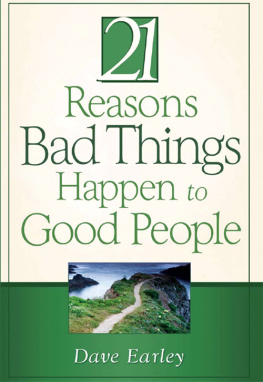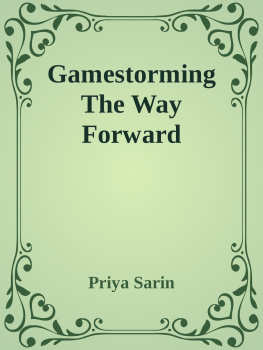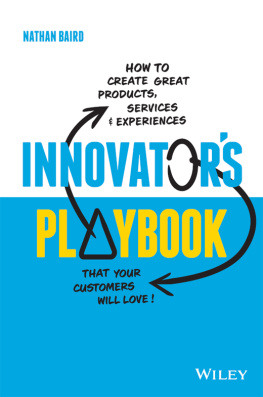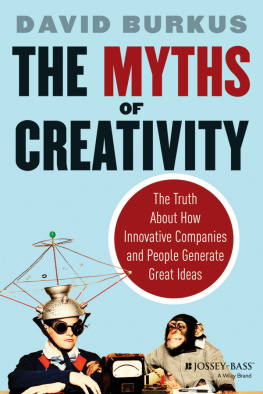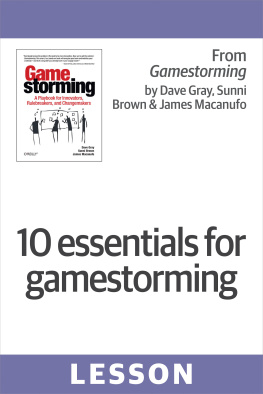Gamestorming
Dave Gray
Sunni Brown
James Macanufo
Copyright 2010 Dave Gray, Sunni Brown, and James Macanufo
O'Reilly books may be purchased for educational, business, or sales promotional use. Online editions are also available for most titles (.
The O'Reilly logo is a registered trademarks of O'Reilly Media, Inc. Gamestorming , the cover image, and related trade dress are trademarks of O'Reilly Media, Inc.
Many of the designations used by manufacturers and sellers to distinguish their products are claimed as trademarks. Where those designations appear in this book, and O'Reilly Media, Inc. was aware of a trademark claim, the designations have been printed in caps or initial caps.
Innovation Games is a registered trademark of The Innovation Games Company.
Graphic Guides is a registered trademark of The Grove Consultants International.
While every precaution has been taken in the preparation of this book, the publisher and authors assume no responsibility for errors or omissions, or for damages resulting from the use of the information contained herein.

O'Reilly Media
Dedication
To Michael Doyle, my friend and mentor
Dave Gray
To my mother, who showed all of us the meaning of unconditional love
Sunni Brown
To Drew Crowley, who is good at it
James Macanufo
SPECIAL OFFER: Upgrade this ebook with OReilly
for more information on this offer!
Please note that upgrade offers are not available from sample content.
Advance Praise for Gamestorming
" Gamestorming will revolutionize how you generate ideas and align your team. Moving away from brainstorming and toward gamestorming will produce outcomes unimagined."
Nancy Duarte, CEO Duarte Design, Author of Slide:ology and Resonate
"Wow, this IS the definitive guide to workshop methods for managers and professionals."
Dr. Martin Eppler Director of the Institute for Media and Communication Management University of St.Gallen, Switzerland
"Dave, Sunni, and James weren't fooling around when they wrote Gamestorming . It's a brilliant book that'll help every team plow through the wicked challenges they face on a daily basis, in a creative and fun way."
Jared M. Spool Founding Principal of User Interface Engineering
"Life is full of gamesif you want to win and have fun doing it, this is the place to start"
"At Zappos, one of our core values is to 'Be Creative, Adventurous, and Open-Minded.' Gamestorming is a great how-to manual for achieving that."
Foreword
In the early 1960s, the celebrated children's author Peggy Parrish introduced us to Amelia Bedelia, an overly literal housekeeper. Among other things, Amelia makes a sponge cake with real sponges, replants weeds when told to "weed the garden", and hits the road with a stick when she's told that the family is going to "hit the road" when leaving for a camping trip. My children squeal with laughter when they read about her comical adventures.
I often find myself laughing along with my children, until I think of the Amelia Bedelias I've met at work. Suddenly, the mistakes that people make while trying to perform their jobs aren't so funny. Mistakes that stem from a lack of clarity about the goals and objectives of a project or the failure to consider the ramifications of making a process change in a complex system. Mistakes created from teams who haven't given themselves the freedom to explore alternatives, or from teams who haven't invested the time to choose thoughtfully from the alternatives they've invented or discovered.
Although the loss of productivity caused by these kinds of mistakes is considerable, these mistakes result in more than that. They generate frustration among the team as work must be redone. They result in unnecessary meetings, because once the mistakes are realized, yet another meeting must be called to figure out what to do. The mistakes clog up our email inboxes, because instead of being comfortable in knowing whom I must email about what, I instead just cc: or, even more insidiously, bcc: , everyone.
These mistakes can be prevented through the use of the games described in this book.
Yes, games.
As Dave, Sunni, and James so thoughtfully explain, serious games help organizations solve complex problems through collaborative play. Drawing from their rich and varied experiences and backing it up with theory, Dave, Sunni, and James start with an overview of why these games help organizations become markedly more effective. Armed with this understanding, they then share with us a broad catalog of games that teams can use to solve a variety of complex problems.
As a designer of such games, I am especially impressed that Dave, Sunni, and James have included a wide variety of games, drawn from their experience and the collected experience of many others in our field. The result is that they have written a "Monday Morning Ready" book: you can read this enjoyable book in a single weekend and put the ideas to work when you start work on Monday morning.
Keep your copy of this book handy, though. While you'll likely start with just one or two of the games included here, chances are good that you're going to quickly return to this book, or the website www.gogamestorm.com, to see what new games Dave, Sunni, and James (with the help of their dedicated community) have found to help you realize your goals.
Luke Hohmann
Founder and CEO
The Innovation Games Company
Preface
IN 1807, THE GRIMM BROTHERS BEGAN COLLECTING FOLK TALES that had, up until that point, never been written down. In 1812, they published a collection of 86 tales under the title Children's and Household Stories . By the seventh edition, the last published in their lifetime, the collection had grown to 211 tales. If not for the work of the brothers Grimm, we might never have heard such stories as Rumpelstiltskin, Snow White, Sleeping Beauty, Rapunzel, Cinderella, Hansel and Gretel, Little Red Riding Hood, and the Frog Prince.
Jacob and Wilhelm Grimm were motivated by a few things: as philologists, they wanted to understand the linguistic elements of the stories and their sources; as historians, they wanted to record the stories as they were told in households; as storytellers, they wanted to entertain, and as Germans (there was no single German state at the time) they were interested in understanding and developing a sense of common identity among German-speaking peoples.
A few years ago, the co-authors of this book embarked on a similar project: our goal was to identify a set of emerging methods and approaches to work that have been germinating since the 1970s and are deeply intertwined with the burgeoning Information Age.
Since the invention of the computer chip, we have been moving from an industrial to a post-industrial economy, where the nature of work is changing. In an industrial society, workers are expected to fit standardized job descriptions and perform their duties according to clear policies, procedures, and prescriptions. Knowledge work is fundamentally different: workers are expected not so much to perform standard roles but to generate creative, innovative results that surprise and delight customers and colleagues. They are expected not only to perform a function but to design new and better products and services, and even to provide dramatic, breakthrough results.



